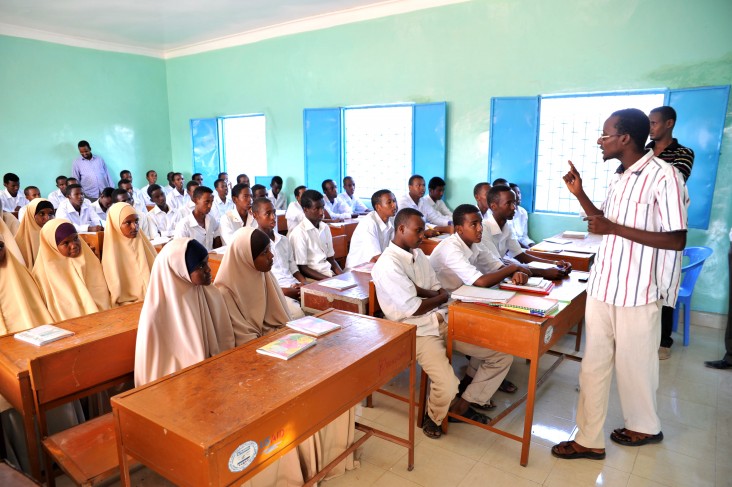
Somali Youth Learners Initiative (SYLI)
ACTIVITY OVERVIEW
USAID’s Somali Youth Learners Initiative (SYLI) aims to support the next generation of Somali leaders by expanding access to quality secondary education opportunities for over 150,000 youth. Through SYLI, the Federal Government of Somalia and regional Ministry of Education officials receive support in strengthening secondary education, teachers participate in trainings to enhance their classroom skills, and youth gain access to economic opportunities, enabling them to become responsible members of society that contribute to their communities.
In Somalia, youth comprise the majority of the population. However, many lack basic education, employment opportunities, and a meaningful connection to the issues and governance of their community. Only 42% of children are enrolled in primary school, and of an estimated population of two million youth aged 15-24, only 6% are enrolled in secondary school. Youth unemployment in Somalia is estimated at 67%, one of the highest rates in the world.
ACTIVITY AREAS
In Somalia, SYLI aims to meet the high demand for education and provide a safe space for youth to learn and acquire life skills. Across all regions of Somalia, SYLI provides an array of opportunities to youth, including Formal and Non-Formal Education that promotes literacy and numeracy, skills training and entrepreneurship that builds economic survival, leadership and conflict resolution training that strengthens civic participation and social cohesion. Throughout these efforts, SYLI promotes equal participation of boys and girls. SYLI also develops the capacity of Ministry of Education officials to provide fair, equitable, and quality education services to Somali youth through construction of schools, training of teachers, provision of teaching and learning materials, and develops the capacity of local Community Education Committees to sustain these investments.
ACTIVITY IMPACT
USAID so far has provided training and assistance to 60 secondary schools through SYLI, focusing on schools in communities where the government and community members are able to lead reform efforts; in communities that have experienced high levels of violence; and where threats of extremism and criminality are prevalent.
SYLI collaborated with education authorities in providing education services for 25,407 (16,202 males and 9,205 females) secondary school-aged students in 57 schools across Somalia in the academic year of 2016-2017. To increase access to education, 333 classrooms were completed in addition to 455 other structures, such as science laboratories, latrines, libraries, perimeter walls, girl friendly spaces and administrative offices. The additional classroom spaces have enabled more students to attend classes while reducing the number of students per classroom, creating a more conducive learning environment.
USAID’s education assistance in Somalia resulted in outstanding completion rates for the 2015-2016 academic year, which averaged 97% (98% for boys and 95% for girls). This demonstrates that when given the opportunity, young people want to go to school and stay in school.
Access to education also requires providing the essential tools for teaching and learning. With USAID assistance through SYLI, almost 20,000 textbooks and other teaching and learning materials were provided. 233 pre-service female teachers graduated from a two year course in education in September 2016 and are now being recruited in schools throughout the country. In addition, 2,231 (2,148 male and 183 female) in-service teachers completed short and long-term training at qualified teacher training institutes across all regions. The trainings focused on student-centered learning and classroom management skills as well as English, mathematics, and science subjects.
To build Somali capacities, SYLI trained and supported staff from the Ministries of Education in Mogadishu and Galmudug to carry out public tendering processes for school construction. Potential contractors from the community were invited to bid for contracts and were assessed based on predetermined criteria in a blind review session conducted by the Ministry and USAID’s implementing partner. In both cases, the Ministries had never carried out a public tendering process before and vowed to do so for all future construction activities. Promoting transparency is critical for building trust of local authorities as well as for promoting equity.
To foster a culture of tolerance and social engagement, more than 41,000 youth across Somalia participated in civic engagement activities. SYLI collaborated with the Ministries of Youth, Education and local youth organizations to provide youth with the right platforms and opportunities to network and discuss critical issues affecting them through advocacy forums. Furthermore, to create incentives for youth to work, SYLI integrated skills development training with innovative technology for the benefit of 382 youth. Of the 382 youth who graduated, 156 micro-entrepreneurs and youth-owned microenterprises were given small business grants to start their own businesses.








Comment
Make a general inquiry or suggest an improvement.